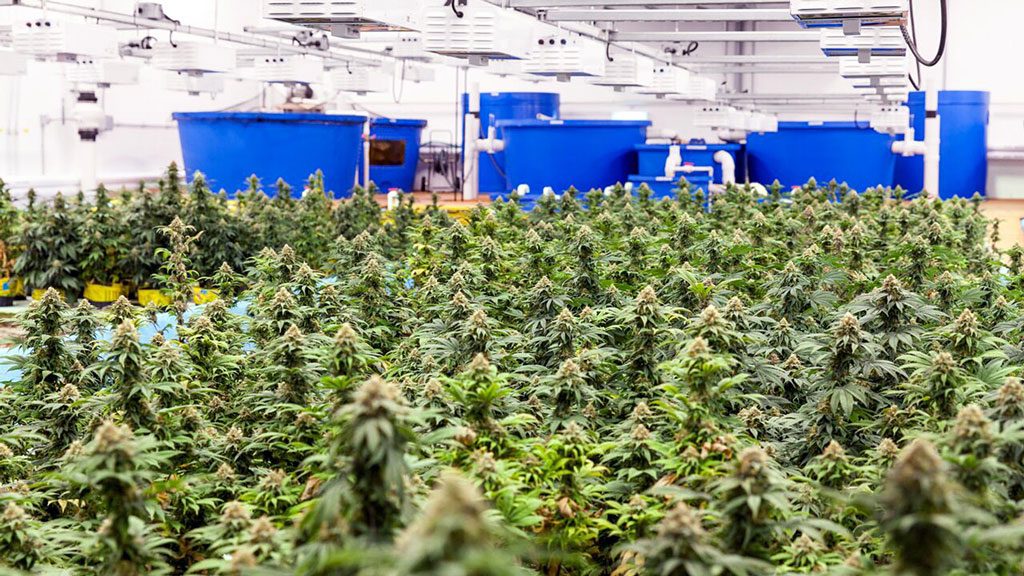Green Relief, a Hamilton, Ont.-area medicinal cannabis company, is undergoing a massive $70-million two-arm expansion.
The company recently acquired the 55-acre lot next door to their existing facility at 780 Concession 8 West in Flamborough to construct a $60-million, 240,000-square-foot aquaponics school and centre of excellence that is expected to be complete in late 2019.
The post-secondary college will be a type of trade school to educate those interested in pursuing a career in this quickly growing form of agriculture.
“We’ll need about 1,000 people for our purposes and imagine we’ll be bringing in students from all over,” said Green Relief president Steve LeBlanc.
Currently, the company operates a 33,000-square-foot concrete grow-op built into a hillside.
“We feel that this is the agriculture that will feed the world in the future due to the fact that we produce a protein and (also) produce vegetables using one-tenth the amount of water of any conventional grow known to man. We grow in two acres of aquaponics what you can grow in a 60-acre field,” LeBlanc claimed.
Aquaponics is Green Relief’s chosen method of growing organic medical cannabis. It is a sustainable growing method where fish and plants work together in a balanced ecosystem that uses 90 per cent less water than conventional agriculture, the company described.
In the process, Green Relief raises tilapia in their aquaponics system. The fish are fed organic high quality feed resulting in a source of lean, healthy animal protein for consumption.
As part of the cycle, they work with the Hamilton non-profit organizations Second Harvest and Good Shepherd to donate 300 to 350 pounds of 1.5-pound tilapia once the fish reach market weight (every five weeks) to be made into protein rich meals.
Green Relief CEO Warren Bravo said up to 50,000 protein meals are provided to non-profits annually.
He added when it comes to construction, “all Hamilton trades and engineers…as many as I can find,” are used for their building projects, which are led by the Schilthuis Group of Companies.
“As a company we have always loved the projects that can be more than just four walls and a roof. We take great pride in being able to help the client with solving constructability concerns or issues while still trying to keep the project on budget. The Green Relief projects have been a series of these problem-solving exercises,” said Schilthuis Construction Group president Henry Schilthuis.
“As the industry changes, evolves and grows there are ever changing requirements for the owners. We are on the forefront of an emerging industry, with a company whose mandate is to be on the cutting edge of that industry. We are growing and learning as the owner learns and part of our responsibilities as construction managers is to help him realize these changes into the buildings that he is designing. We love the challenges associated with a project of this nature.”
The second Green Relief expansion project is a $10-million-plus retrofit of an indoor sports complex that the company bought to transform into an extension of their existing Flamborough operation.
As of Nov. 1, the company will officially take possession of a 100,000-square-foot indoor sports facility formerly known as Players Paradise, located at 565 Seaman St. in the east-Hamilton area of Stoney Creek.
In order to get operations up to Heath Canada’s rigorous standards, the contractors must adhere to very specific regulations, including, according to Bravo, “a robust HVAC system so no smell goes out to the public.”
Under the direction of Schilthuis management, contractors will retrofit the complex into 75,000-square-feet of growing area on two levels to double the production output.
About one-third of the project cost is estimated to be towards electrical retrofits and a request for an increase of three megawatts of power has been submitted.
“Compliance issues, security and biosecurity will be a big deal,” said Bravo.
Upon completion, it will house tiers of growing capacity 16 feet and 30 feet high, as well as 25,000-square-feet of office space. Also included will be a storefront dispensary and a glassed-in learning centre that will be open to curious passersby.
Bravo says the project is on an “aggressive” four-month schedule with the hopes of being operational by March 2019 and having crops ready for harvest by June or July. The operation will also create 100 full-time jobs.











Im very interested, will there be an IPO?